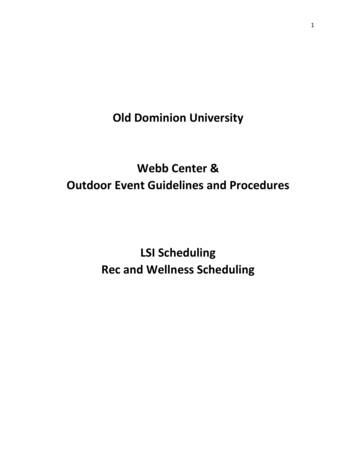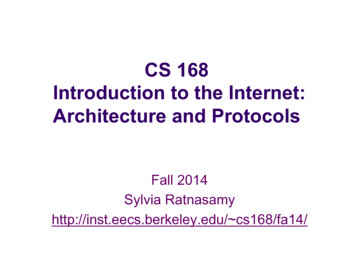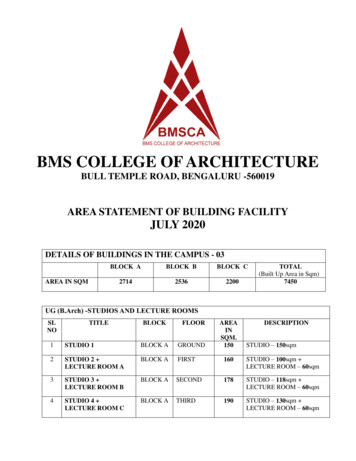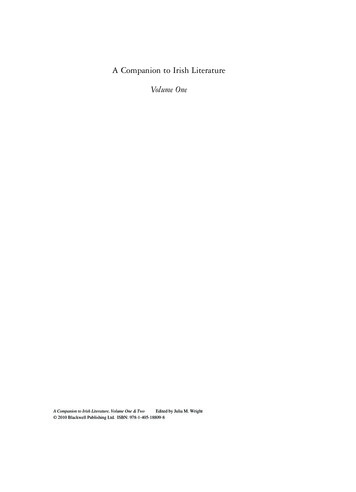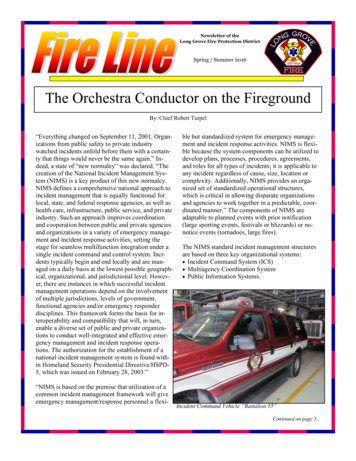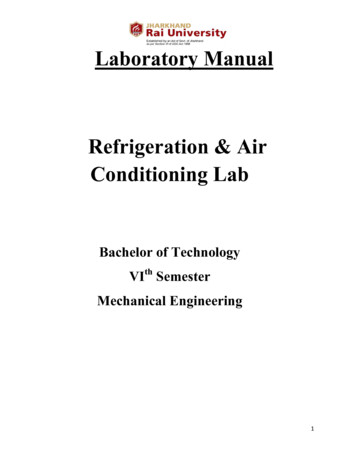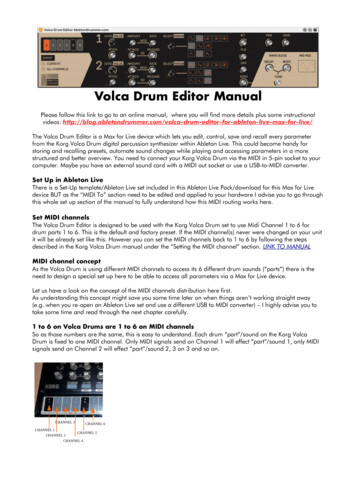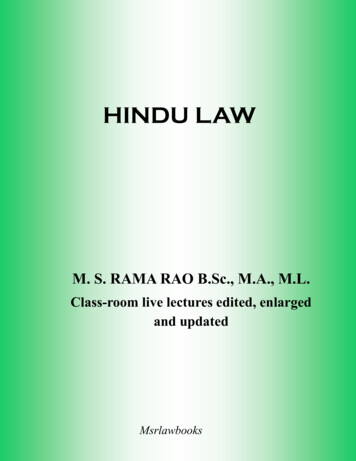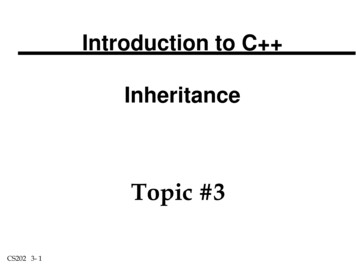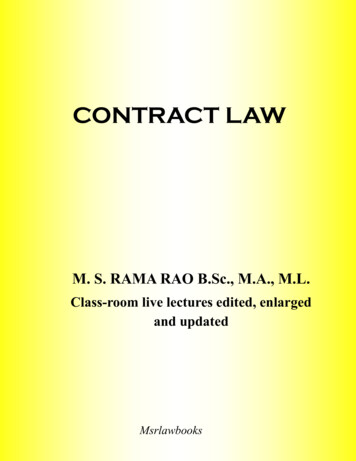
Transcription
CONTRACT LAWM. S. RAMA RAO B.Sc., M.A., M.L.Class-room live lectures edited, enlargedand updatedMsrlawbooks
CONTRACT ACT[Indian Contract Act,1872 ]INTRODUCTIONThe contract act was enacted in 1872. Prior to this the Hindus and themuslims in India had their own laws and usages. The impact of the variouscharters of the 17th and 18th centuries, the introduction of English Commonlaw and Statutes, led to many problems. It is to obviate these that the IndianContract Act was enacted.The Contract Act deals with the basic essentials of a contract andclassifies it into valid, void and voidable contracts. Sns. 1 to 75 are to be readin a sequence and each principle is to be studied with points and the cases.Much attention should be given to the illustrations and examples. .Page1SYLLABUS: The Indian Contract Act: Sns. 1 to 74msrlawbooksCONTRACT ACTPTO
1.Definition of "Promise", "Consideration" etc. (Sn.2)2.Communication, Acceptance and Revocation of proposals (Sn.3 to 9)3.Valid, voidable and void agreements (Sns. 10 to 30)4.Contingent contracts (Sns. 31 to 36)5.Performance of contracts (Sns. 37 to 67)6.Quasi-contracts (Sns. 68 to 72)7.Breach of contract (Sn. 73 and 74).QUESTIONS BANK1.2.a) All contracts are agreements, but all agreements are notcontracts, explain b) How is revocation made ?a) What is "Free consent" ?b) Explain "Coercion" and "Undue influence"c) Explain "Fraud" and Misrepresentation"3.a) Who are competent to enter into contract ?b) Discuss with cases, the law relating to the validity ofcontracts entered into by a minor.4.a) "An agreement made without consideration is void" Explain andrefer to exceptions.b) "Contracts opposed to public policy are void" Explain.5."Agreement in restraint of legal proceedings are void" Discuss.6.What is a Wagering Contract ? Explain the law relating to agreementsby way of wager.7.Summarise the provisions governing contingent contracts.8.Discuss "Anticipatory breach of contract'.9.Explain the rules relating to devolution of joint rights. Refer to Indianand English Law.10a) "An agreement to do an impossible act is void" Explainb) Discuss the doctrine of "Frustration of Contract". Refer to Cases.11.State and explain the law relating to "appropriation of payments".Page212. Discuss the doctrine of quasi-contracts OR Discuss the variousrelations, resembling those created by Contract Act.13.Distinguish between 'Penalty' and 'Liquidated' damages.Refer to Hadley V. Buxandale and explain the rules relating toaward of damages.14.Write shorts notes on :1) General and standing offersmsrlawbooksCONTRACT ACTPTO
2) Valid, void and voidable contracts3) Tender4) Novatio5) Quantum merit6) Maintenance and champerty7) Reciprocal promises8) Executed, executory and past consideration9) Privity of contract10) Contract in restraint of marriage11) Contract in restraint of trade12) Discharge of contract13) Time as essence of contract14) Effect of mistake of fact or law on contract15) Invitation to treat.15. State the facts & the decision inl.Carlill V Smoke Ball Company2. Bolfor.VBolfor3. Dickinson V Dodds4. Mohori Bibi V Dharmadas Ghosh5. All card V Skinner7. Deny V Peek6. Cundy V Lindsay8. Hadley V l. Contracts. Offer Acceptance andRevocation12. Offer33. Acceptance54. Revocation of proposals and acceptance65. Stranger to a contract76. Valid, Void, or Voidable contracts8Page31 Contract-Definition and EssentialsCh.2. CapacitymsrlawbooksCONTRACT ACTPTO
1. Minors contract102. Insanity, Idiocy11Ch.3. Free consent 1 Ch.4. Voidable contracts1.Undue influence142. Fraud153. Misrepresentation164. Mistake of fact19Ch.5. Consideration1. Consideration212. Agreement in restraint of marriage243. Agreement in restraint of trade244. Agreement in restraint of legal proceedings25Ch.6. Wagering and contingent contracts1. Wagering contract262. Contingent contract28Ch.7. Discharge of contracts1. Discharge of contracts302. Anticipatory breach313. Doctrine of impossibility324. Doctrine of frustration33Ch.8. Appropriation36Ch.9. Quasi contracts1. Quasi contracts38Ch. 10. Unjust enrichment0Ch. ll. DamagesPage4Ch.12. Miscellaneous1. Uberrimai Fidei442. Tender44msrlawbooksCONTRACT ACTPTO
3. Maintenance and champerty446Reciprocal promise6. Time as essence of contract487. Quantum merit488. Lawful consideration499. Coercion49TABLE OF CASESChaptersCh.l. Offer, Acceptance 2.Offer: Harvey V.FaceyBalfour V. BalfourCarlill V. Smoke Ball CompanyHyde V. Wrech 4.RevocationDickinson V. DoddsTweedle V. AtkinsonCh.2. Capacity1.Minors contract.Mohori Bibi V. Dharmadas GhoshSadiq ali Khan V. Jai KishoreRider V. WombwellCh.4. Voidable contracts 1.Undue influenceAllcard V. SkinnerFraud2.Deny V. Peek3 Misrepresentation Bannerman V. White4.Amiraju V. Seshamma; Ashely V Renolds5.MistakeCh.5. ConsiderationCundy V. indsayThomas V. ThomasRestraint of Marriage1.Lowe V. Peers, Venkata Krishna V. VenkatachalamRestraint of Trade.Nordenfelt V. Nordenfelt Co.Page52.Ch.7. Discharge or breach of contract .msrlawbooksCONTRACT ACTAnticipatoryPTO
Breach Frost V. Knight Hoechester V. De la Tour4.Doctrine of Frustration, Taylor V. CaldwellKrell V. Henry,Fibrosa v. FairbornSatyabrata Ghosh V. MugneeramCh.8. AppropriationClayton's caseCh.9-1. Quasi contracts . Rider V. WombwellCh.10 Unjust EnrichmentDamodar Mudaliar V. Sec. of StateCh.ll.Damages Hadley V. BuxandaleFathe chand V. Balkrishna DasCh.12.MaintenanceFisher V. Kamala Naiker Ammiraju V. Seshamma AshleyPage6V. ReynoldsmsrlawbooksCONTRACT ACTPTO
CHAPTER 1CONTRACTS, OFFER, ACCEPTANCE AND REVOCATION[Sections [Sns ] refer to sections of Contract Act]Ch. 1-1 ContractDefinition and Essentials :Sn.2(h),Contract Act defines a contract. According to it, a contract is anagreement enforceable by law. It is thus an agreement between two or morepersons, to do or not to do some act. In fact, every promise, forming theconsideration for each other, is an agreement. If the agreement is notenforceable, the contract is void. Hence, all contracts are agreements, butnot all agreements, contracts.Essentials : Sn.10. Contract ActThe essentials of a valid contract are : i) Consent of the parties i.e.,Consensus ad idem ii) Legal capacity or competence of the parties iii)Consideration and iv) Lawful object and lawful consideration 1)i)Consent:It is defined in Sn. 13 : Two or more persons are said to give consent,when they agree on the same thing in the same sense i.e., consensus adidem. It is not free, when there is coercion, undue influence, fraud ormisrepresentation. In such a case, the contract becomes voidable. But,when there is no consent, the contract becomes void.ii) Legal capacity :Sec. 11 of the Contract act, states that the parties to the contract mustbe competent to contract. There is no capacity, when a party is a minoror insane, an idiot or when he is disqualified according to any special lawto which he is subject.A contract with a minor is void ab initio.[from the beginning] Aperson below 18 years of age is a minor (21 years for a ward under aguardian). The leading case is Mohori Bibi V. Dharmadas Ghosh.iii) Consideration :An agreement without consideration is void. (Sn. 25 Contract Act).Consideration is defined in Sn. 2(d). When at the desire of thepromisor, the promisee or any other person has done or abstains from doing,or does or abstains from doing, or promises to do or abstains from doing,something, such act or abstinence or promise, is called a consideration for thepromise.Page71. The rule is "ex nudo pacto, non oritur actio" [On naked pact(contract),no action arises ].i.,e. without consideration, no actionarises. Consideration must be clear, specific and not illusory.msrlawbooksCONTRACT ACTPTO
It may be inadequate, if parties agree to the contract. By that itselfcontract will not become void.But, the general rule is "no consideration, no contract". But thereare exceptions.1. When agreement is made on account of natural love andaffection (e.g.Gift by father to daughter), it should be in writing andto be registered.2. Compensation, promised for services rendered.3. Past consideration is good consideration,iv) Lawful object :According to Sn.23 of the Contract Act, the consideration or object ofthe agreement must be lawful otherwise the contract is void.The consideration or object is not lawful :If i) it is forbidden by lawii)It is of such a nature that if permitted it would defeat the provision ofany lawiii)it is fraudulentvi)it involves or implies injury to the person or property of anotherv)it is immoral or opposed to public policy.e.g. (1) A, B & C agree to divide their earnings got by fraud. (2)lease agreement of a house for immoral purposes.Ch.1-2. Offer and invitation to treat: Sn. 2(a) :Offer or proposal is defined in Sn.2(a) of the contract act."When one person signifies to another his willingness to do or toabstain from doing anything, with a view to obtaining the assent of that other,to such act or abstinence, he is said to make a proposal (offer).The person who makes the proposal is called a "promisor", the personaccepting the proposal is called a promisee.When the promisee gives his assent, it becomes "Acceptance", (i) Theoffer must be definite and give rise to legal consequences.Page8Invitation to treat:According to Anson, as offer is different from an "invitation to treat".A catalogue of goods for sale is not an offer but only an invitation to offer.A shopkeeper who keeps his goods in the shop window with label of priceattached, is making an invitation to offer. Similarly, a mere reply to a letterquoting prices will not constitute a proposal to sell.msrlawbooksCONTRACT ACTPTO
(a) Harvey V. Facey :H telegraphed, "Will you sell us Whiteacre? Telegraph lowestprice". F replied : "Lowest price 900". H telegraphed "We agree to buy for 900 asked by you".Held : There is only an offer, by H to buy. It is for F to accept or not.Here, F has not accepted. Hence, there was no acceptance.(b) Balfor V. Balfor :Husband H, promised to send 23 a month to his wife W, as long asshe remained away from him.Held : W cannot sue. The promise of H was never intended to give riseto legal consequences.(ii) General & Specific offer :An offer may be general or specific. It is a specific offer when it is madeto a definite individual or to a definite group of individuals.It is, considered as a General offer when it is made to anunascertained group of individuals i.e., to the public at large. Here, offer canbe accepted by any individual. Hence, if a reward is fixed, any person whofulfils the conditions may claim the award.The leading case is Carlill Vs. Smoke Ball Company.In this case, the defendant advertised that they would pay 100 poundsto anyone who gets influenza, after using their smoke-ball. This smoke-ballis to treat the nostrils with a kind of carbolic acid snuff. This is to be used asper directions of the defendant company. The company had deposited moneyin a bank to show their sincerity. Carlill got influenza after using it. Sheclaimed the reward. The court held that the company was liable to she wasentitled to the reward.Jude Bowen held, the advertisement was not an invitation to offer, buta general offer which was accepted by the lady and hence, it became a bindingcontract. She had used on the faith of the advertisement. Her acceptance ofthe smoke-ball needs no communication to defendant. Her performance thatis by using as per direction was sufficient acceptance.This case shows thatoffer, if it is to be capable of acceptance, must have a promise by offeror thathe will bind himself, if conditions are followed.Similarly, Railway time-table is an invitation to offer. Ch.1-3.Acceptance of offer :Page9According to Anson "An acceptance is to an offer what a lighted match isto a train of gun powder". This means when the offer is accepted it becomesa contract.According to Contract Act Sn.2(b): When the person to whom, theproposal is made signifies his assent thereto, the proposal is said to bemsrlawbooksCONTRACT ACTPTO
accepted.A proposal when accepted becomes a promise.According to Sn.7, in order to convert a proposal into a promise, theacceptance must be :i) Absolute and unqualifiedii) Be expressed in some usual and reasonable manner.But if a particular mode is prescribed, it must be accepted in thatmode. Otherwise, the proposer may insist on such a mode. If he does notinsist, he is said to have accepted.Acceptance should be absolute :Hyde V. Wrench : W offered to sell his farm to H for 1000. H saidhe would buy for 950. W did not agree, later H agreed for 1000. Questionwas whatever there was acceptance.Held : there was no acceptance, as it was qualified, i.e., to buy for 950.Communication of a proposal when complete :i) It is complete, when it comes to the knowledge of the person to whomit is made.ii) The communication of an acceptance is complete.as against the proposer, when it is in communication to him,so as to be out of the power of the acceptor.a) as against the acceptor, when it comes to the knowledge ofthe proposer.i) A proposes by letter to sell his house to B for Rs.50,000/-Thecommunication is complete when B receives it.ii) B accepts A's proposal by a letter by post.The communication of acceptance is complete, as against A, when theletter is posted, and as against B, when A receives the letter.Ch.1-4. Revocation of proposal and acceptance : Sn.6The communication of revocation is complete :i) as against the person who makes the revocation, when it is put intocommunication to the person to whom it is made, so as to be out of the powerof the person who makes it.Page10ii) as against the person, to whom it is made, when it comes to hisknowledge.e.g. A revokes his proposal to sell his house to B, by a telegram. Therevocation is complete as against A, when the telegram is despatched.It is complete as against B, when B receives it.B revokes his acceptance by telegram. B's revocation is complete asmsrlawbooksCONTRACT ACTPTO
against B, when the telegram is despatched, and as against A, when it reacheshim.Revocation of a proposal:1) By issuing notice of revocation by the proposer to the otherparty.2) By efflux of time prescribed.If no time is prescribed, by the lapse of a reasonable time.3)By the failure of the acceptor to fulfil someconditionprecedent (prior condition).4) By the death or insanity of the proposer.Leading case : Dickinson V. Dodds.On 10th June, Dodds made an offer to sell his dwelling house for 800 to Dickinson. "The offer was left open upto 9 a.m. 12th June". But, on llth itself he contracted to sell the house to ‘A'. Dickinson handed over hisletter of acceptance before 9 a.m. on 12th. Dodd said "you are too late. I havesold my property".Dickinson sued Dodds.Held, there was no contract.Comment: Anson has doubted this decision.This is no longer good law in India. In India, a proposal is revoked bynotice of revocation by the proposer to the other party, or on the efflux of timeif time is prescribed , or by lapse of a reasonable time if no time is fixed.Ch.1.5. Stranger to a contract :A stranger is not a party to the contract and hence cannot sue.Consideration is defined in Sn. 2(d).When at the desire of the promisor, the promisee or any other personhad done something .such act .is consideration for the promise.Hence, consideration may flow from the promisee or any other person.Hence, the question is whether a stranger can sue ?Tweddle V. Atkinson :Here H & W were husband and wife. H's father and W's father agreedto pay money to H and that H could sue. When both parties to agreementdied, H sued W's father's executors for the money. HeldPage11that H was stranger and hence, cannot sue.Hence, it is a settled law that a stranger cannot sue.Exceptions :1. When a contract confers benefit on third party, such a benefimsrlawbooksCONTRACT ACTPTO
ciary, as in trust may sue.2. Trust in favour of a stranger is valid.3. When money is due under a family arrangement or partition,to a stranger. In the above circumstances, stranger can sue.Ch.1.6. Valid, void, voidable and unenforceable contracts :a) Valid contract:It is an agreement which has all the requisites of a contract.i) Free consent ii) Consideration iii) Lawful object iv) Legal capacityof the parties. Hence, such a contract is valid and is enforceable in a court oflaw (Refer. Ch.1.1).b) Void contract :It is an agreement without any legal effect. It is a nullity. It is notenforceable in a court of law. An agreement not enforceable by law is void.Eg.1) Contract with a minor Sn.ll.2) Contract without consideration Sn. 25.3) Contract with object unlawful Sn. 234) Wagering contract Sn. 30.5) Contract in restraint of trade Sn. 27. or in restraint ofmarriage. Sn. 26.c) Voidable contract: This is an agreement which is enforceable by law at the option of one of the parties thereto but not at theoption of the other.Voidable contract is a valid contract until it is set aside by the court.The person who has the right to rescind must do so within a reasonable time,ie., 3 years.Any agreement made under undue influence, coercion, fraud,misrepresentation is voidable. Hence, when the court sets aside the contractthe contract becomes void.Undue influence Add ch. 5.1. Fraud AddCh. 5.2. Misrepresentation : Add Ch. 5.3.Coercion Add Ch. 5.4. d) Unenforceablecontract:12CHAPTER 2PageIt is a contract which is otherwise valid in all respects but cannot beenforced on account of some technical defects like insufficient stamps, notwritten in a particular form, etc.CAPACITYmsrlawbooksCONTRACT ACTPTO
Ch.2.1. Minors contract:Section 11 of the contract act, states that the parties to the contractmust be competent to contract is that, the two parties must not be "incapax".There is no capacity when a party is a minor or insane, an idiot or whenhe is disqualified according to any special law, to which he is subject.i) Contract entered into by a minor is void ab-initio:A person who has not completed 18 years of age is a minor and in thecase of a ward he is a minor until he attains thee age of 21 years.The leading case on this point is Mohori Bibi Vs. DharmadasGhosh (1903).D. Dharmadas a minor executed a mortgage for a sum of Rs.20,000/out of which the money lender M had paid him only Rs.8,000/-. M had noticeof the minority of D, D sued to set aside the mortgage. It was held by privycouncil that the contract was void ab-initio and no question of refundingmoneys arose in such a transaction.This has been followed in a number of cases. Hence it is settled that aMinor's contract is void from the beginning.The aim of the Contract Act is to protect the interests of a minor, andto save him from the transactions in which the other party may have takenadvantage of the minority of the person. It has been held that if a minorperforms his promise and delivers goods to another party, the minor has gota right to recover the price throughhis guardian. The minor is entitled to plead his minority and is not estoppedunder the provisions of the evidence act (Sn.115).This is settled \in SadiqAli Khan V.JaiKishore; a deed entered intoby a minor was held a nullity. False representation as to age, could not stophim from pleading his minority.ii) Necessities supplied to a minor :According to Sn. 68 of the contract act if necessaries are supplied tothe minor then the person who supplies is entitled to be reimbursed of theamounts from the property of the minor. The minor is not personally liable.Leading case : Rider Vs. Wombwell.Supplying golden buttons etc., to a minor was not a "necessity").Page13iii) Estoppel, not applicable to minor :Even if a minor falsely represents himself to be a major and enters intoa contract, the contract is void and unenforceable. The minor may plead hisminority in the suit against him. The rule of Estoppel that he shall not denyhis representation as a major, is not applicable to him. This does not entitlemsrlawbooksCONTRACT ACTPTO
him to cheat persons and gain some advantage. If he cheats a trader and gainsproperty, he will be liable to restore it to the trader.iv) Ratification :As the minor's agreement is void ab initio, the minor cannot ratify andmake the contract valid after attaining majority.There is no specific performance against the minor as the agreement isvoid ab initio.Ch. 2-2. Insanity, Idiocy :Incapacity may arise as a result of insanity or idiocy. The rule insuch a case is that a contract made by an. insane or an idiot is void ab-initio.But a lunatic who is usually of sound mind but occasionally of unsound mindmay make a valid contract, during his lucid intervals. Sn. 12;The test is, such a person must be capable of understanding the contract,and of forming a rational judgement as to his interests. "A", a patient in aMental Hospital, who is at intervals of sound mind, may contract when he is ofsound mind.Drunkenness:Drunkenness is also considered as an incapacity and contract made bya drunken person is void. Hence a man who is so drunk that he cannotunderstand the contract or who cannot form rational judgement cannotmake a valid contract.Other incapacities : Incapacity may arise as a result of the status ofpersons as in the case of foreign sovereigns, Ambassadors, enemy alientsetc.CHAPTER 3FREE CONSENTCh.3. Free consent:Page14One essential requirement of a valid contract is that it must have freeconsent. The parties must have consensus ad idem, that is they must agreeupon the same thing in the same sense. Consent is not free if it is caused byCoercion ; undue influence, fraud or misrepresentation or mutual mistake.That is, but for the existence of coercion, undue influence etc., consent wouldnot have been given. For a valid contract there must be free consent. If it isaffected as in coercion, undue influence etc., the contract becomes voidable.When there is no consent the contract is void.'Consent' is defined in Sn.13. Two or more persons are said to giveconsent when they agree upon the same thing in the same sense i.e.,consensus ad idem.Legal consequences :msrlawbooksCONTRACT ACTPTO
i) If there is a mistake of fact by both the parties, then there is noconsent, and, hence the contract is void. (Sn. 20).A agrees to sell his horse to B. But, at the time of sale the horse wasdead. Both did not know this fact The contract is void.ii) If consent is obtained by fraud, coercion or misrepresentation, thecontract is voidable, at the option of the party affected "A". A may insist thathe may be put in the position in which he would have been put, if there was nofraud or misrepre-sentation.etc.ii)When there is no consent, the contract is void ab initio. Accordingto Sn. 1 : "all agreements are contracts, if they are made by the freeconsent of the parties". Hence, free consent is one of the essentialsof a contract.CHAPTER 4VOIDABLE CONTRACTSCh.4-1. Undue influence : (Sn. 16) :An agreement is said to be induced by undue influence, if the relationsubsisting between the parties is such that, one of them at the time of theagreement.a) was in a position to dominate the will of the other party, andb) that he has used that position to obtain an unfair advantagefor him.There is a presumption of undue influence when :A person who stands in a fiduciary relation to the other, or a personwho holds a real or apparent authority over the other or a person whocontracts with another whose mind is enfeebled by age, illness, physical ormental distress.In such circumstances if the transaction is unconscionable, the onus ofproving that the contract was not under undue influence is on the dominatingperson.Page15There is a presumption of undue influence in the following relationshipsparent and child, guardian and ward ; trustee and beneficiary, spiritual masterand pupil, Doctor and patient etc. The section applies to every case whereinfluence is acquired and abused and where confidence is reposed andbetrayed.Eg. i) A advances money to his son B during his minority. When B attainsmajority, A exercising his parental influence gets a bond for sums excessivethan advanced. A has employed undue influence.iii)D a doctor induces B his patient to pay a very heavy sum for hismsrlawbooksCONTRACT ACTPTO
services. D has used undue influence. )InAllcard Vs. Skinner. P. joined the sisterhood of a church andwas under the spiritual control of D, a lady superior.P had advanced a total of 7000 at various points of time, to D. 6 yearsafter leaving sisterhood, she sued D to recover the amounts.Held that advances were made under pressure ; (undue influence) butthe suit was barred by time.Legal consequences : The contract vitiated by undue influence isvoidable and the party affected may sue to get the declaration that thecontract is void.A forges B's signature. B, threatening to prosecute A, gets a bondfrom A for Rs.2000/- The bond is voidable, at the option of A.Ch. 4-2. Fraud :Section 17 contract act deals with fraud with reference to contracts.In fraud : 1) There must be an intention to deceive2) The actconnivancemay be by the party to the contract or with his3) There must be suggestion falsi. or4. Active concealment of fact (suppressio vari). or5) A false promise or6) Any act or omission which may amount to a fraud according to law.If a party has entered into a contract in which any one of the aboveelements can be shown, then it is a contract which becomes voidable due tofraud.Leading case is Derry Vs. Peek.In this case, the defendants issued a prospectus stating that thecompany had the right to use steam power instead of horse, on their tramway. The directors had believed that the Board's permission was a mereformality, but the Board refused to give permission to the company to usesteam power. The company was wound up. The plaintiff sued for "deceit". Itwas held that there was no fraud as there was no intention to mislead. It wasan honest mistake on the part of the company.This is no longer good law today. Today according to the CompaniesAct, the directors are liable for negligent misstatements.Page16Mere silence will not amount to fraud unless keeping silence itselfamounts to fraud under the circumstances.Eg. 1. A sells by auction to B a horse which A knows to be unsound, Bbuys the horse and A says nothing about it. This is not a fraud.2. B says to A if you do not deny, I presume that the horse ismsrlawbooksCONTRACT ACTPTO
sound. A says nothing. Mere silence amounts to speech.3. A and B are traders. A enters into a contract with B ; Bagrees to sell at a particular price. But, the market price had gone up which Aknew. B did not know it. There is no fraud. Mere non-disclosure is not fraud.Ch. 4-3. Misrepresentation :Section 18. contract act defines misrepresentation.It means and includes : i) An unwarranted positive assertion of that, asnot true, even though he believes it to be true.ii) Committing breach of duty to mislead another person.iii) Causing a party to the contract to make a mistake as to the subjectmatter of the agreement.Eg : A induces B to believe that C's factory is manufacturing 500metric tonnes of Indigo annually thereby he induces B to buy the factory. Thisis misrepresentation and if B buys, he may avoid the contract as it isvoidable.Mis-representation may be of two kinds :1. it is innocent misrepresentation when there is an honestmistake on the part of the person making representation.2. Wilful representation (Fraud). Here there is a willfulfalsehood with an intention to deceive. This amounts to fraud(Section 17).MisrepresentationFraud1. There is no intention to1. There is an intention todeceive.deceive2: Contract may be rescinded3. The defendant may plead2. Can be rescinded This is alsoa tort of deceit. Can be sued for tortiousliability3. There is deception. Hence deft,that the plaintiff couldcannot plead his innocence,have found the truth withordinary deligence.Breach'of duty : There must be some relationship between the partiese.g. buyer and seller, landlord and tenant, banker and client etc. Themisrepresentation must be material.Page17Bannarman V. White : A agreed to sell to B, hops which had beengrown by A. B's condition was that no sulphur should have been used whilegrowing hops. A had agreed. But, out of 300 acres, in 5 acres sulphur hadbeen used. Held this was a misrepresentation and B may avoid the contract.4.4. Coercion : Sn. 15Coercion is the committing or threatening to commit, any actmsrlawbooksCONTRACT ACTPTO
forbidden by the Indian Penal Code, or the unlawful detaining, orthreatening to detain any property, to the prejudice of any person whatever,with the intention of causing any person to enter into an agreement.Contract made under coercion is voidable at the option of the partywhose consent was so obtained. The reason is that the consent is not free asdefined in Sn. 14. According to this, if consent is caused by coercion, undueinfluence, fraud, or misrepresentation then the contract is voidable at theoption of the party whose consent is so obtained.The essentials of coercion are :1) There must be a commission of (or threatening to commit)an offence under I.P.C.2) There must also be the unlawful detaining (or threateningto detain) any property.Examples : A obtains B's consent at gun point;A threatens to cause grievous hurt and obtains B 's consent for anagreement;A threatens to burn down, valuable documents of B, and obtains B'sconsent.InAmmiraju Vs. Seshamma, H, the husband by creating a threat tocommit suicide, induced his wife W and son to give their properties by arelease deed to B, the brother of H. it was held that threat to commit suicideamounted to coercion, and hence the contract was voidable.In Ashley Vs. Reynolds P pledged his plate with B and took a loan of20 pounds. When P went to B to take back his plate B demanded 10 poundsinterest as otherwise he would not deliver. P paid 20 pounds and also 10pounds, and took delivery. P sued d. Held, D was liable as he had extractedextra money.Coercion and undue influence distinguished :Coercion (Sn. 15)Undue i
idem. It is not free, when there is coercion, undue influence, fraud or misrepresentation. In such a case, the contract becomes voidable. But, when there is no consent, the contract becomes void. ii) Legal capacity : Sec. 11 of the Contract act, states that the parties to the contract must be competent to contract.
